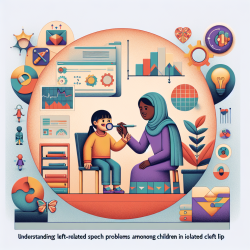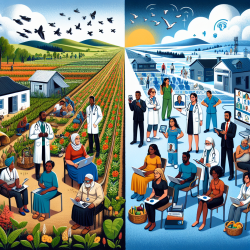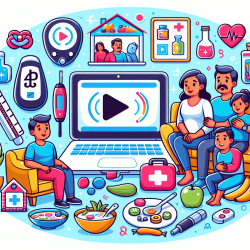Introduction
The COVID-19 pandemic has challenged healthcare professionals across various fields, compelling them to adapt to unprecedented circumstances. A recent study titled "Surgical Oncologists and the COVID-19 Pandemic: Guiding Cancer Patients Effectively through Turbulence and Change" offers valuable insights that can be applied beyond oncology. In particular, speech-language pathologists (SLPs) can glean strategies to enhance their practice, especially in the context of online therapy services like those provided by TinyEYE.
Creating a Safe Environment for Therapy
The study highlights the importance of maintaining a safe environment for cancer care, which is equally applicable to speech-language pathology. For SLPs, this translates to ensuring that online therapy platforms are secure, user-friendly, and conducive to effective learning. Implementing strict data privacy measures and ensuring that technology is accessible and reliable are critical steps to creating a safe virtual environment for children receiving therapy.
Adapting the Multidisciplinary Model
Oncologists have redirected the multidisciplinary model to guide surgical decisions. Similarly, SLPs can benefit from collaborating with other professionals such as educators, psychologists, and occupational therapists. This collaborative approach can help tailor therapy plans to meet the unique needs of each child, ensuring comprehensive care that addresses all aspects of a child's development.
Harnessing Teletherapy
The pandemic has accelerated the adoption of telemedicine, and SLPs have a unique opportunity to leverage teletherapy. By utilizing digital platforms, SLPs can continue to provide essential services while accommodating physical distancing. This approach not only ensures continuity of care but also expands access to therapy for children in remote or underserved areas.
Understanding Interactions and Ethical Considerations
The study discusses the interactions between COVID-19 and cancer therapy, emphasizing the need for ethical decision-making. For SLPs, this means being mindful of the ethical implications of therapy delivery during a pandemic. It is crucial to prioritize the well-being of children while balancing the demands of therapy and the constraints imposed by the pandemic.
Advocating for Children
Just as oncologists advocate for their patients, SLPs must advocate for children who require speech and language therapy. This involves ensuring that therapy services are prioritized and that children receive the support they need, even in challenging times. Advocacy also includes educating parents and caregivers about the importance of continued therapy and how they can support their child's progress at home.
Conclusion
The lessons learned from surgical oncologists during the COVID-19 pandemic offer valuable guidance for speech-language pathologists. By creating safe environments, embracing multidisciplinary collaboration, leveraging teletherapy, and advocating for children, SLPs can continue to provide high-quality care. These strategies not only enhance therapy outcomes but also ensure that children receive the support they need to thrive.
To read the original research paper, please follow this link: Surgical Oncologists and the COVID-19 Pandemic: Guiding Cancer Patients Effectively through Turbulence and Change.










